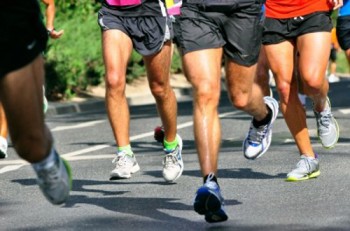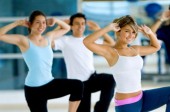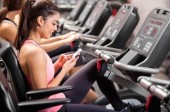Search Podcasts
Is your body ready for the upcoming event? Become a nutritional powerhouse and achieve your goals.
Additional Info
- Segment Number 4
- Audio File train_your_body/1238tb2d.mp3
- Featured Speaker Nancy Clark, RD
-
Guest Bio
 Nancy is a registered dietitian (RD) and board certified specialist in sports dietetics (CSSD). She offers personalized, one-on-one sports nutrition counseling to casual exercisers and competitive athletes in the Boston-area. She teaches her clients how to have more energy, lose undesired body fat, and enjoy a winning sports diet.
Nancy is a registered dietitian (RD) and board certified specialist in sports dietetics (CSSD). She offers personalized, one-on-one sports nutrition counseling to casual exercisers and competitive athletes in the Boston-area. She teaches her clients how to have more energy, lose undesired body fat, and enjoy a winning sports diet.
Nancy's "how to" books on nutrition for sports and exercise, including her best selling "Nancy Clark's Sports Nutrition Guidebook" and food guides for new runners, marathoners, soccer players and bicyclists are popular resources. They include tips on day to day eating and how to lose weight without starving yourself. - Length (mins) 10
- Waiver Received Yes
- Host Melanie Cole, MS
7-Time Olympic medalist, Shannon Miller, shares the story of her difficult journey from superstar athlete to cancer survivor.
Additional Info
- Segment Number 4
- Audio File train_your_body/1239tb2d.mp3
- Featured Speaker Shannon Miller, Olympic Gymnast
- Organization http://www.ACSM.org
- Guest Website http://www.shannonmillerlifestyle.com
-
Guest Bio
Shannon Miller remains the Most Decorated Gymnast in American History. She is the only American to rank among the Top 10 All-Time gymnasts and is the only female athlete to be inducted into the US Olympic Hall of Fame – Twice! (Individual (2006) and Team (2008))
Recently, Shannon launched her company Shannon Miller Lifestyle: Health and Fitness for Women to empower women to make their health a priority. Shannon is an television host, radio host and will be in London as an analyst with Yahoo Sports! - Length (mins) 10
- Waiver Received Yes
- Host Melanie Cole, MS
America’s most decorated female gymnast shares her best advice for optimal health & fitness for busy people.
Additional Info
- Segment Number 3
- Audio File train_your_body/1239tb2c.mp3
- Featured Speaker Shannon Miller, Olympic Gymnast
- Organization http://www.ACSM.org
- Guest Website http://www.shannonmillerlifestyle.com
-
Guest Bio
Shannon Miller remains the Most Decorated Gymnast in American History. She is the only American to rank among the Top 10 All-Time gymnasts and is the only female athlete to be inducted into the US Olympic Hall of Fame – Twice! (Individual (2006) and Team (2008))
Recently, Shannon launched her company Shannon Miller Lifestyle: Health and Fitness for Women to empower women to make their health a priority. Shannon is an television host, radio host and will be in London as an analyst with Yahoo Sports! - Length (mins) 10
- Waiver Received Yes
- Host Melanie Cole, MS
Simple, but effective steps you can take now, to help guide your children away from the sedentary video screens, and toward a healthier lifestyle.
Additional Info
- Segment Number 2
- Audio File train_your_body/1239tb2b.mp3
- Featured Speaker Hilary Knight, Olympic Hockey Player
- Guest Bio Hilary Knight made her Olympic debut at age 20 in Vancouver as the youngest member of the U.S. womens Hockey team. She has played in five world championships, starting in 2007 at age 17, when the U.S. team took the silver medal. She helped lead the University of Wisconsin Badgers to win the NCAA championship during her junior year.
- Waiver Received Yes
- Host Melanie Cole, MS
Hilary Knight explains why she believes that dedication to a fitness routine can change your life.
Additional Info
- Segment Number 1
- Audio File train_your_body/1239tb2a.mp3
- Featured Speaker Hilary Knight, Olympic Hockey Player
- Guest Bio Hilary Knight made her Olympic debut at age 20 in Vancouver as the youngest member of the U.S. womens Hockey team. She has played in five world championships, starting in 2007 at age 17, when the U.S. team took the silver medal. She helped lead the University of Wisconsin Badgers to win the NCAA championship during her junior year.
- Waiver Received Yes
- Host Melanie Cole, MS
Do you want a heavy-duty weight room, or a club with awesome aerobics? A serene and peaceful environment, or one that's lively and loud?
Additional Info
- Segment Number 2
- Audio File train_your_body/1238tb2b.mp3
- Featured Speaker Neal Pire, MS
- Guest Website http://www.InspireTrainingSystems.com
-
Guest Bio
 Neal Pire is a nationally noted expert on athletic conditioning and fitness training. He operates Inspire Training Systems, a professional training business specializing in both sports performance enhancement and fitness. Typical of Neal Pire's approach is INSPIRE BOOTCAMP, the most supportive fitness program in the New York Metro area.
Neal Pire is a nationally noted expert on athletic conditioning and fitness training. He operates Inspire Training Systems, a professional training business specializing in both sports performance enhancement and fitness. Typical of Neal Pire's approach is INSPIRE BOOTCAMP, the most supportive fitness program in the New York Metro area.
Formerly, Neal served as vice president of a major fitness company. He is widely sought after as a consultant for athlete training programs, performance enhancement centers and fitness industry management. Neal Pire is a Fellow of the American College of Sports Medicine and author of Plyometrics For Athletes at All Levels. As a 30-year veteran with deep understanding of the subject matter, he is often asked for background, commentary or analysis by media covering fitness and sports training. - Waiver Received Yes
- Host Melanie Cole, MS
You're looking for a fitness routine that will get your heart pumping. Is it Zumba? Hot Yoga? Fitness Bootcamp?
Additional Info
- Segment Number 1
- Audio File train_your_body/1238tb2a.mp3
- Featured Speaker Neal Pire, MS
- Guest Website http://www.InspireTrainingSystems.com
-
Guest Bio
 Neal Pire is a nationally noted expert on athletic conditioning and fitness training. He operates Inspire Training Systems, a professional training business specializing in both sports performance enhancement and fitness. Typical of Neal Pire's approach is INSPIRE BOOTCAMP, the most supportive fitness program in the New York Metro area.
Neal Pire is a nationally noted expert on athletic conditioning and fitness training. He operates Inspire Training Systems, a professional training business specializing in both sports performance enhancement and fitness. Typical of Neal Pire's approach is INSPIRE BOOTCAMP, the most supportive fitness program in the New York Metro area.
Formerly, Neal served as vice president of a major fitness company. He is widely sought after as a consultant for athlete training programs, performance enhancement centers and fitness industry management. Neal Pire is a Fellow of the American College of Sports Medicine and author of Plyometrics For Athletes at All Levels. As a 30-year veteran with deep understanding of the subject matter, he is often asked for background, commentary or analysis by media covering fitness and sports training. - Waiver Received Yes
- Host Melanie Cole, MS
A new study shows you work out at a lower intensity when talking or texting on your phone, but higher intensity if listening to music with it.
Additional Info
- Segment Number 4
- Audio File train_your_body/1521tb2d.mp3
- Featured Speaker MIchele Stanten
- Organization ACSM
-
Guest Bio
 Michele Stanten, a walking coach (mywalkingcoach.com) and ACE-certified fitness instructor, has been inspiring and motivating people to get active for more than 20 years.
Michele Stanten, a walking coach (mywalkingcoach.com) and ACE-certified fitness instructor, has been inspiring and motivating people to get active for more than 20 years.
Michele is the author of Firm Up in 3 Weeks and Walk Off Weight, and co-author of Walk Your Butt Off! As the former Fitness Director of Prevention magazine, she created a marathon walking program and coached thousands of readers to walk full and half marathons across the country. Michele has also produced and appeared in more than a dozen exercise DVDs and created numerous audio workouts.
Michele has been a presenter at the ACSM Health & Fitness Summit, serves on the Board of Directors for ACE, and is a member of the Every Body Walks Collaborative. She has written for a variety of publications, including Self, More, Weight Watchers, and Shape magazines. Her numerous media appearances include The Today Show, Good Morning America, The Biggest Loser, CNN, USA Today, and NPR. -
Transcription
RadioMD Presents: Train Your Body | Original Air Date: May 19, 2015
Host: Melanie Cole, MS
Guest: Michele Stanten
Train your body. Here's exercise physiologist Melanie Cole, M.S.
MELANIE: Are there certain things that go against your workout? You think you're doing so great and you're texting your friend or you're using your cell phone. You're listening to music. Does that hinder or does that help your workout?
That's a great question. My guest is Michelle Stanton. She's a walking coach and an A-Certified fitness instructor and she's been motivating people to get active for a long time--almost as long as me.
Welcome to the show, Michelle.
So, let's talk about things that hinder your workout. Let's start with music, since this seems to be something that has stood the test of time.
MICHELLE: It has.
MELANIE: Music and motivation. So, is music good or bad? Does it depend on the music?
MICHELLE: Music is definitely good. Studies show that it can help you to go faster, go longer, it can increase your pace. So, there's a lot of good things. It makes you feel good and they've found that depending on your musical taste you can get benefits from a wide variety of music. But one of the downfalls with the music here is that a lot of us are listening to it on our iPhones or on our cell phones. So, then we have other options of things to do with our cell phones when we're working out, like talking and texting. And those things may not be so good for your workout.
MELANIE: Okay, so maybe just playing the music and it probably should be motivational music. I mean if you're picking some sad Bread song or something, there I am dating myself, but it's probably not going to be the best to work out to. But the fact that you're listening on a device that you that can do other things, is what you're saying takes you away from the task at hand?
MICHELLE: Yes. And a new study from Kent State University just came out showing that music helps people to increase their speed, it increases their heart rate, and it increases the enjoyment. But, when they were talking on their cell phone or texting, it was a big difference.
Talking increased the enjoyment that the people had when they were on their cell phone. However, it decreased their speed. Their heart rate remained about the same. So, you're slowing down and I've seen this even with clients when I have them wearing heart rate monitors and they're walking at a good pace, and then as soon they start to talk to me, their heart rates dropped. So, we're seeing the same thing if you're talking on your cell phone while you're out jogging or running or you're on the treadmill. And, so you may not be getting the best workout. If your goal is to get a workout in, and we're all constrained by time, so a lot of us want to go for those higher-intensity, short workouts. If you're talking on your phone, you're not getting the most benefit.
Texting is even worse. If you're texting on your phone when you're out, your speed decreases, your heart rate decreases, and you don't get any boost in the enjoyment of your workout. So, definitely skip the texting. Talking may have a place. For example, if you're going out for an easier workout, or you're really not motivated to go out and talking can to a friend while you're going is going to get you to go out there. So, it can have some benefits, but, again, if you want to maximize your workout, put your phone on airplane mode so you're not going to be distracted by a text or a phone call, and then play your upbeat music and get out there and go. And that's going to give you your best workout effect, when you've got your cell phone.
MELANIE: One thing that cracks me up. People drive around to get closest parking spot when they're going to the gym.
MICHELLE: Yes, absolutely!
MELANIE: You mentioned some of that. And, I am somebody who my kids say "Mom, really?" because I park as far away in the parking lot as I can.
MICHELLE: Oh, I do the same thing!
MELANIE: You know, to force us to walk. But, we're in the field and we know that these little things make a difference, but when you're at the gym to try and get that front space, that's funny.
MICHELLE: Yes. Or, taking the escalator instead of the stairs to go to the gym if it's on the second floor, or third floor, or fourth floor. So, yes, one of the things. Studies have shown this: that when people initiate exercise programs, not all the time, but some people do, so you have to be conscious of that. They then, in turn, compensate for that by decreasing activity throughout their day. And, we know that we all sit too much. In fact, there was a great study that was done on marathoners and half-marathoners. So, they were training 6-8 hours a week. But, they were still sitting anywhere from 8-10 hours a day.
So, even athletes can sit too much. So, if you are starting a workout, don't let your workout be an excuse to sit on the couch more or to not park farther away. All the research is showing that those exercises, those workouts don't make up for the fact that we lead such sedentary lives.
MELANIE: Absolutely!
MICHELLE: And we need that movement throughout the day for maximum health. To decrease our risk for diseases and by sitting too much, even if you are doing that workout, you're shutting your body down. If your goal is weight loss, you're making it tougher.
MELANIE: Well, and the thing is that people do use that as an excuse. "Oh, I did my workout this morning, so now it doesn't matter if I eat this or if I have a donut for breakfast or if I sit at my desk all day or if I ... because I worked out this morning!" But, really, it has to be something you continually do throughout the day and what do you mean when you say some people focus too much on HIIT, because you know, HIIT Training was at the top of the American College of Sports Medicine's fitness trends. People are doing high-intensity interval training all over the place now and thinking that this is just what they need to be doing. And, I'll tell you what, Michelle, some of my clients will say to me "You're not working me hard enough," if I stop the HIIT training for a few minutes, if they're not breathing heavily, if they're not grasping at their sides, they feel like I'm not pushing them hard enough.
MICHELLE: Yes. Well, and we have this mentality that more is better. And HIIT workouts are fabulous. There are tons of benefits, but these are not meant to be done every day. In fact, some studies have shown that if you over-do these high-intensity workouts, you decrease the benefits that you're going to get. So, you're negating the benefits. High-intensity interval workouts, you are meant to do for short periods of time and only two to three times a week. You need those rest days, those recovery times in between. You don't get stronger and get better and get healthier during the workout. It's that rest period afterwards that your body is rebuilding and getting stronger and if you're not giving it that time to do that, then, again, you're not going to get the best benefits. You're going to over-train, and then you're going to be at more risk for injuries and illness and then that's just going to sideline you even more.
We've kind of lost this low-intensity, long, slow duration types of workouts and in reality, those provide benefits. Athletes--even though they perform at high intensities--the best training regimens for them, to get the most, is they only train at those high-intensities for 10-20% of the time. And the other part of their ... 80-90% of their training is at moderate to low-intensity.
So, we all need to mix up our workouts. In fact, in one study, runners who increased their low-intensity workouts improved their 10K time 30% more than runners who added higher-intensity workouts.
MELANIE: Wow!
MICHELLE: So, there is a benefit and we really need a mix of these types of workouts.
MELANIE: We do.
MICHELLE: So, don't just go all with HIIT.
MELANIE: And, so listeners, you know, as she says, more doesn't necessarily mean better. You don't have to be gasping for breath throughout your whole workout. Some of the workout should involve flexibility and stretching and a little yoga and your abdominals and strength training and cardio-vascular, and mix it all up and for 10 minutes in the workout, jump around. Do your jumping jacks, on and off the treadmill. Whatever it is you want to do, you can do those things, but it doesn't have to be the whole entire time. So, now, in just the last 30-45 seconds, Michelle, wrap it up against the moves that work against our workouts. Things that we're doing that are hindering the results that we get.
MICHELLE: The other biggie is to make sure you're getting enough sleep. That's a key part of that recovery and rest to get the most benefits from your workouts. That's when hormones like our growth hormone are active, and as we age, growth hormone decreases, so now, if you're cutting back on your sleep, that hormone is taking a nosedive. So, you're not getting those benefits. And, they've shown when athletes add extra sleep to their cycle, they get faster, their accuracy improves, their reflexes are faster, and they're happier.
So, that's helping with athletes is going to help all of us. We know that less sleep makes it harder to lose weight and increases our risk for diseases. All the reasons we're working out.
MELANIE: And that's great information. You're listening to Train Your Body right here on RadioMD. Thanks so much for listening and stay well. - Length (mins) 10
- Waiver Received No
- Host Melanie Cole, MS







